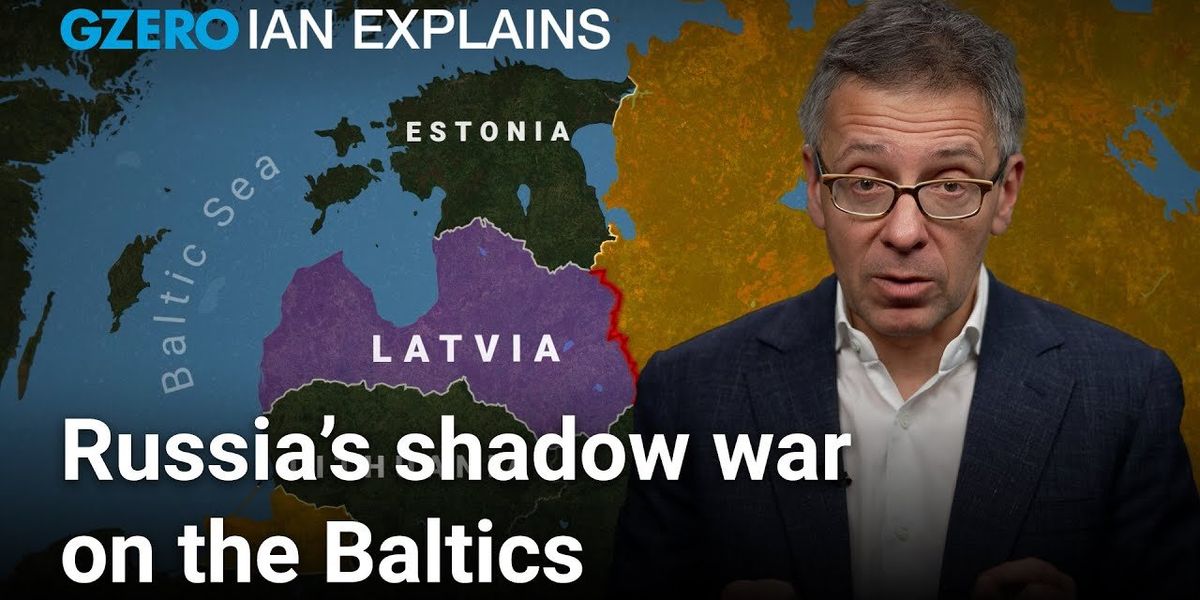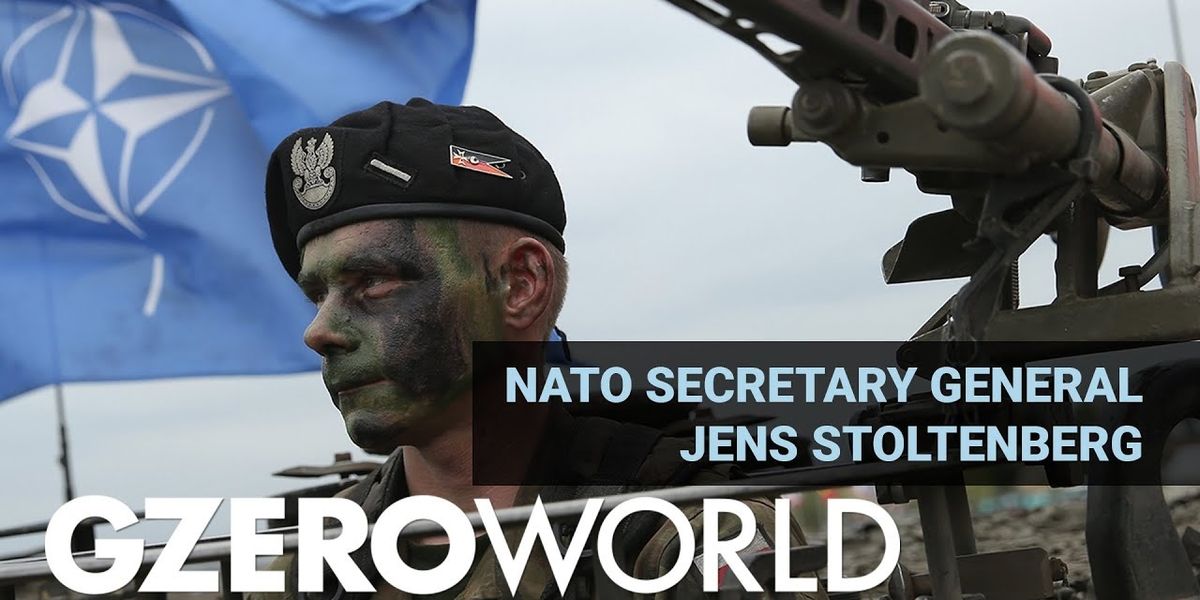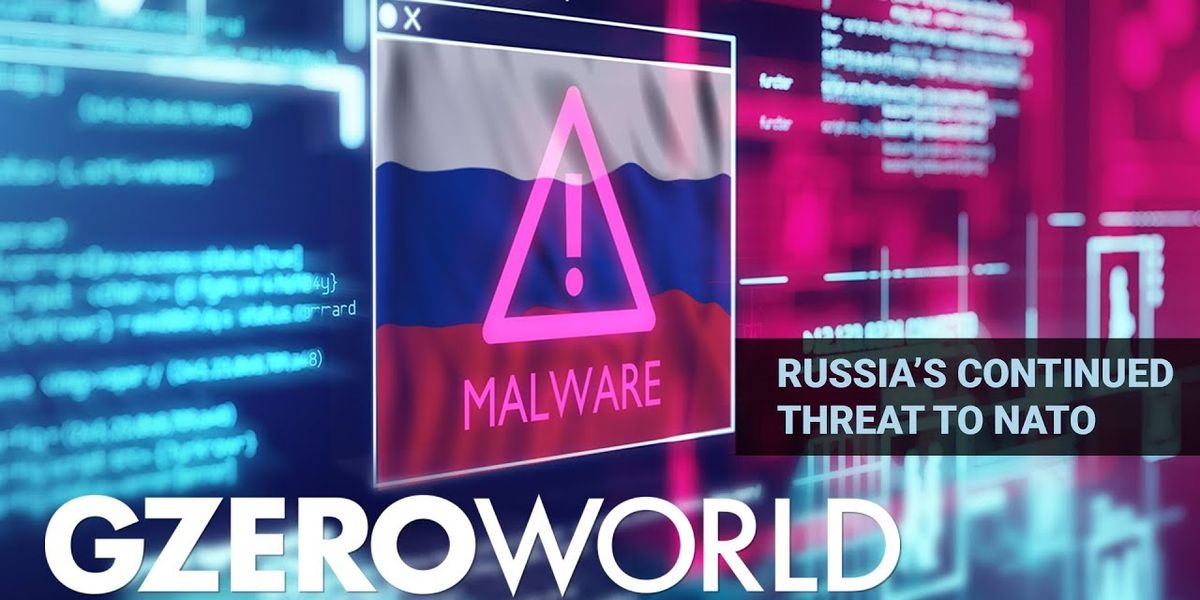Trending Now
We have updated our Privacy Policy and Terms of Use for Eurasia Group and its affiliates, including GZERO Media, to clarify the types of data we collect, how we collect it, how we use data and with whom we share data. By using our website you consent to our Terms and Conditions and Privacy Policy, including the transfer of your personal data to the United States from your country of residence, and our use of cookies described in our Cookie Policy.
{{ subpage.title }}
Could Russia invade the Baltics next?
Baltic leaders have few illusions that once Putin is done with Ukraine he won't look to his northwest neighbors next. On GZERO World with Ian Bremmer, Latvian Foreign Minister Baiba Braže addresses concerns about a potential Russian invasion of the Baltic states, saying that such a move would be an entirely new ballgame and would mean direct war with NATO; even still, Braže says, no scenario should be ruled out. “The task for all of us is not to exclude anything. So to be ready, to be prepared, to exercise, to test, and to make sure it doesn’t happen,” she says.
Braže underscores the importance of NATO’s deterrence strategy, stressing that the alliance must demonstrate both strength and resolve to prevent any miscalculations from Moscow. Beyond conventional military threats, she highlights the dangers of hybrid warfare, including cyberattacks and disinformation, as key battlegrounds in the ongoing struggle between Russia and the West.
Watch full episode: The fight to decide Ukraine's fate
GZERO World with Ian Bremmer, the award-winning weekly global affairs series, airs nationwide on US public television stations (check local listings).
New digital episodes of GZERO World are released every Monday on YouTube. Don't miss an episode: subscribe to GZERO's YouTube channel and turn on notifications (🔔).
The fight to decide Ukraine's fate
As Russia’s war in Ukraine grinds on, the Baltic states—Latvia, Estonia, and Lithuania—are watching their eastern neighbor with growing concern. With cyberattacks, undersea sabotage, and military buildup along its border, Latvia is at the forefront of Europe’s efforts to counter Russian aggression. On GZERO World, Latvian Foreign Minister Baiba Braže joins Ian Bremmer in New York to discuss Ukraine's fate, the region’s security challenges, the role of NATO, and how Trump’s evolving stance on Russia could leave European in the lurch.
Also on the show, Bremmer speaks with former Russian colonel Dmitri Trenin, who offers a starkly different perspective from Moscow, arguing that negotiations over Ukraine should be decided primarily by the US and Russia—not Ukraine or Europe.
GZERO World with Ian Bremmer, the award-winning weekly global affairs series, airs nationwide on US public television stations (check local listings).
New digital episodes of GZERO World are released every Monday on YouTube. Don't miss an episode: subscribe to GZERO's YouTube channel and turn on notifications (🔔).
Russia’s next target? Why the Baltics are wary of Putin
How far will Russia go to reassert its influence? This question has haunted Europe for decades. The collapse of the Soviet Union in 1991 was supposed to mark a turning point, but for the Baltic nations—Estonia, Latvia, and Lithuania—the shadow of Russian aggression has never truly lifted.
Fast forward to Christmas Day of 2024, when a rickety oil tanker flying the flag of the Cook Islands was caught dragging an 11-ton anchor along the seabed of the Gulf of Finland, severing a critical power cable between Estonia and Finland. Finnish authorities boarded the ship, confiscating 100,000 barrels of illicit Russian oil. EU officials believe the vessel was part of Russia’s so-called “shadow fleet”—aging tankers used to evade sanctions. Some of those same ships, they warn, may also be engaging in acts of sabotage.
Energy infrastructure isn’t the only target. Cyber warfare has long been part of Russia’s playbook. A 2007 cyberattack on Estonia, widely attributed to Moscow, was an early warning of how modern warfare would evolve. Today, those threats have only intensified. Google’s intelligence experts have recently identified Russia’s elite hacking unit, Sandworm, probing Baltic energy grids for weaknesses—the same strike team that has repeatedly shut down power across Ukraine.
It’s no wonder that Latvia, Estonia, and Lithuania now spend more on defense, as a percentage of GDP, than most NATO members. Latvia, for example, has boosted its defense budget from under 1% of GDP in 2014 to a projected 5% by 2026. That’s a figure high enough to impress even US President Donald Trump. And as President Trump signals a more conciliatory stance toward Moscow—softening relations while berating Ukraine’s leadership—the question isn’t just how far Putin will go, but will the West be able to stop him?
GZERO World with Ian Bremmer, the award-winning weekly global affairs series, airs nationwide on US public television stations (check local listings).
New digital episodes of GZERO World are released every Monday on YouTube. Don't miss an episode: subscribe to GZERO's YouTube channel and turn on notifications (🔔).
- Lithuanians decide on dual citizenship ›
- Sweden deploys troops to Latvia ›
- When Russia is your neighbor: Estonian PM Kaja Kallas' frontline POV ›
- Could this spread beyond Ukraine? ›
- Leaders of Poland, Nordic & Baltic countries affirm strong support for Ukraine ›
- As Russia gains ground in Ukraine, Baltic states worry the war will spread west ›
Illustration of the NVIDIA logo.
Hard Numbers: Delayed chip exports, Three-day workweek, Tim Cook’s view on regulation, Concern vs. excitement, Security pact
1.9%: NVIDIA is building new computer chips to sell to China that are compliant with updated US export regulations. But the California-based company recently announced a delay in the release of those chips until Q1 2024, citing technical problems. In response, NVIDIA’s high-flying stock, which took the company’s valuation north of $1 trillion this year, fell 1.9% on Friday.
3: Microsoft co-founder Bill Gates doesn’t think AI is going to take everyone’s job, but he does think it could lead to a three-day workweek. “I don't think AI's impact will be as dramatic as the Industrial Revolution,” Gates told Trevor Noah on the comedian’s podcast, “but it certainly will be as big as the introduction of the PC.”
18: Apple CEO Tim Cook thinks that generative AI needs “rules of the road and some regulation,” which he expects will come in the next 18 months. “I think most governments are a little behind the curve today,” Cook said on a podcast with the pop singer Dua Lipa. “I think the US, the UK, the EU, and several countries in Asia are quickly coming up to speed.”
52%: More Americans, some 52%, are concerned about the use of AI than they are excited about it, according to a Pew Research Center survey. Ten percent are more excited than concerned, and 36% have mixed feelings.
18: A group of 18 countries, headlined by the US and UK, announced on Sunday that they had signed a pact to ensure AI systems are safe from cybersecurity threats. The commitments are voluntary but offer guidelines to companies developing AI systems at a time when governments are still in the early stages of crafting regulation to rein in the emerging technology.Will NATO adapt to emerging global threats?
The world has changed significantly since the fall of the Berlin Wall. Has the intergovernmental military alliance of NATO—which was founded to counter the Soviet threat to the West—done enough to keep up with today's landscape of global threats? Secretary General Jens Stoltenberg joins Ian Bremmer on GZERO World to make the case for a modern, 21st century NATO. He'll discuss how the alliance is adapting to a variety of threats and challenges ranging from the rising influence of China to cyber warfare to the coronavirus pandemic.
NATO Secretary General Jens Stoltenberg: Russia’s continued threat
NATO Secretary General Jens Stoltenberg is not naïve about the continued threat that Russia poses to his organization, which was founded shortly after WWII to counter Soviet aggression. But he also sees a silver lining in Putin's belligerent moves. "For the first time in many years, allies are investing more in defense. And all of this is very much triggered by Russia's behavior since 2014." Stoltenberg also believes that a critical step to confronting Russia will be to beat them on the cyber battlefield. His conversation with Ian Bremmer was part of the latest episode of GZERO World, which begins airing nationally in the US on public television November 13th. Check local listings.




